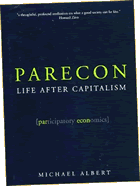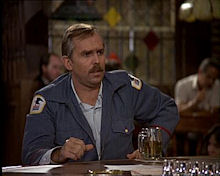Posted December 13, 2007
So… I’ve been mulling over my reaction to this book by Michael Albert, Parecon. Friends on a blogging engine, LiveJournal, directed my attention toward it. I read it with very close attention. Herewith is my response, finally.

A decade ago, I would have tossed this book aside in contempt for one reason only: it gave up the linguistic battle (well… it does that in a few ways, but hold on) over the traditional language of the left. Michael Albert won’t use the word socialism. He thinks that socialism, as a word and a concept and a political and economic system, is so thoroughly befouled by the lived experience of the Soviet Union and every other attempted revolution, especially including Cuba, that it is not recuperable. His word for these societies is “coordinatorist”. No, I’m not making that hideous word up, it’s his coinage. Coordinatorist, so-called for the layer of bureaucrats and technocrats whose “expertise” actually informs (if not really MAKING) the economic and pretty much thus the political decisions of those states.
However, I clenched (or maybe UNclenched) my jaw and decided to read on, despite this heresy. I wanted to get beyond my knee-jerk reactions to that dismissal of a whole tradition that I don’t think Albert understands very well, however long his history of participation in the quasi-anarchist left.
And here’s the thing. Albert (and the other people he worked this shit out with) are actually doing something. I can see the critiques. I can criticize the language he invents and uses (and he’s not blind to that criticism; he’s well aware of his weakness as a writer.) But thinking that ideas are cloaked in verbal sludge DOES NOT (unless you are closeminded and an idiot) invalidate the ideas. It makes them harder to approach and appreciate, perhaps. But it doesn’t make them less important.
Parecon is the latest and most nitty gritty version of Albert et al’s attempt to work out a post-capitalist economic (and social) framework. In itself, that is something to be fucking LAUDED. How often do socialists do that? I’ll tell you how often. Fucking never. Utopian authors do it, or have done it, often in the guise of science fiction. Socialists since Marx have not done it. Marx’s five-million-times-quoted “hunt in the morning, fish in the afternoon, write Capital at five past nine” shit DOES NOT COUNT. The only other references I’m aware of are from his Correspondence and involve a semi-coy and quite amusingly gendered remark that “you can’t make the recipes of the future until you’re in the kitchen of the future”. Well, Betty Crocker and Nixon and Khruschev my ass, is that so? (Sorry; that’s a reference to a hilarious postcard I once saw of Nixon and Khruschev at a model homes show, peering into the Kitchen of the Future — and yes, Khruschev was wearing unmatching black socks; I looked. The “Kitchen Debates”.)

Bryan, Bellamy… Albert?
Albert is wanting (well, now, after the WTO and Seattle, he is wanting; I think his attempts predate that, though) to create an economic theory and practical model for the antiglobalists to seize on. He’s wanting to be the new Edward Bellamy (oh, VERY MUCH that) and the new William Jennings Bryan and, hell, the new Charlotte Perkins Gilman, too for all I know — she tried this sort of ex-nihilo economic analysis too, in Women and Economics, as well, of course, as trying her hand at a gender utopia and gender critique in Herland.
Frankly, that’s fucking EXCELLENT. We NEED a new Edward Bellamy et al. Noam Chomsky’s great (except for his fucking groveling Kerryism) and all, but he critiques without a recipe, too.
So. Participatory Economics. That’s what Albert theorizes. A way of running an economy that celebrates and prioritizes five key values (sounds like the Greens, here): equity, participatory self-management, diversity, solidarity, and efficiency. I think Albert added “sustainability” as an afterthought, too. I asked someone on my LJ what they thought Doug Henwood’s reaction to Albert’s work was, and this person said that Doug Henwood said, as far as they remembered, “Too many meetings.”
Well, yeah, in his future there will be a lot of meetings. But even the socialist science fiction I read these days features mindboggling numbers of meetings (cf. Red Mars, Green Mars, Blue Mars by Kim Stanley Robinson.) I think that maybe we’re just going to have to accept that the price of a participatory democracy is a lot more fucking meetings and a lot more fucking votes and referenda. As Albert points out, it’s not like they don’t happen anyway — in corporations and billions of office jobs every day — without any real voice in the decision-making process. Wouldn’t it be better to have way too fucking many meetings that actually meant something concrete instead of the Dilbert-deal meeting?
I’m not going to summarize the whole argument, because I think people should check out the book, wade past the writing and didactic tone, and read it themselves. I will say a few things, though.
The first section is basically a breakdown of what an economy is and what it does; a demystification, especially because many socialists only really understand the marxist CRITIQUE of capitalism, rather than your basic Econ 101 supply-’n-demand shit. God knows that’s my situation. But despite the breakdown method, it’s neither patronizing (or not much; I’m pretty sensitive to patronizing work) nor too technical. I think the most technical he gets is the idea of input/output. And maybe production versus allocation of goods.
The second bit is his justification of some of the values he cites. He doesn’t spend much time on what he thinks his readers probably agree on (diversity gets a nod; we all agree racism is bad, right? it’s not so clear exactly how this system does away with it, though… and a lot of the links between this economic idea/method and the politics he feels it will automatically produce are similarly reductionist… quite familiar for a marxist — the political superstructure that will arise because of THESE particular relations of production as a base will be diverse, will privilege equity and solidarity and feminism and queer liberation because it is nonhierarchical ITSELF — and that’s as far as he goes.

I guess there will be HELLA meetings if anything falls short in those areas). He spends more time on the places he thinks that critics of rapacious capitalism might carp at. In other words, on the question of remuneration. Actually, maybe he’s aiming that at the frequenters of sports bars (which is supposedly where he thinks people should test out this theory and recruit to it). Americans care about what they’re paid and why they’re paid what they’re paid. They also care about how much control they have over how they do their work.
(Anyone who doubts this, and who wonders what it has to do with class identification and politics should go read this and this follow up, both from gordonzola’s livejournal.)
Therefore a large part of the second section of his book is about remuneration, and how people will get paid what they’re paid. He shifts the classic marxist “from each according to his ability to each according to his need” to “from each according to his ability to each according to his sacrifice and effort”. There’s room for need, if someone cannot put in the effort or make the sacrifice. But his idea of remuneration (which borrows AN AWFUL LOT from Edward Bellamy, author in 1888 of the “utopian” novel Looking Backward) is more that people’s effort, particularly in what are now thankless jobs, and their sacrifice should be compensated. The less control you have over the conditions of your work, the less enjoyable and intrinsically rewarding it is, the more you ought to get for it. The classic marxist answer was always that a socialist society would automate all that shit. Or that cleanup of shit. I’ve always had some trouble with that: first, can it ALL be automated? Second, how does automating everything unpleasant and routine fit with the question of sustainability? Third, that was some asshole male socialists’ answer to feminism, too: automate the housework, and then you whining women won’t have anything to get on our back about.
So I have some sympathy with the rejection of the “simple” socialist answer. Too, Albert’s real point isn’t that a ditchdigger or a garbage collector should get paid more than a doctor. His REAL point is that everyone’s jobs should contain some mix of the enjoyable, the rewarding, and the fucking boring shitwork that has to get done. I’m down with that. He calls it a “balanced job complex”. Okay. Whatever. His language is ugly as hell, I said that already. (I mean, come on PARECON? That’s like, bad in a SovWord and/or Orwellian sense… it recalls the Comintern, double plus ungood think, agitprop… EWWW. However, as I said, the sludgy nature of the prose is no excuse not to look at the ideas.)
After justifying his ideas about remuneration, Albert does a little magic — he ends capitalism by simply saying that with the parecon system, the only shift that will have to occur mentally is the abolition of private PRODUCTIVE property — of ownership of the means of production. Every privately held enterprise will now belong to all people in the society, whether that’s accomplished by bits of paper called “stock” ownership (which would be meaningless, since control of “stock” would not be how investment of inputs would be decided) or by fiat by the national council or whatever. People will still have private personal property, though how much more private consumption they will do from the moment parecons dominate society will depend on their remuneration and on what they vote at several levels of consumer councils. Obviously, one thing it won’t be is centrally controlled by the State, and particularly not a management committee of experts.
He spends the rest of the book detailing how production units which are parecons will create an economy which values mass participatory democratic decision making about both HOW something gets made (the workers) and WHETHER it should get made (the workers and the consumers). Frankly, meetings included, it’s fascinating. In fact, his long section on decision making and how to be flexible about different forms of decision making (one-person/one-vote AND consensus, not OR) has been very helpful to me in a few discussions already. Again and again, bits of this book have forced their way to the front of my brain and mouth in conversation with people. I really do think that people should go out and read it and think about it themselves. What OTHER post-capitalist blueprints do we have to discuss, after all?
The last thing I’ll say about this whole deal is that there was a debate between Michael Albert and Alan Maass of the International Socialist Organization.
I waited a long time between finishing Parecon and reading this debate. I wanted to have my own reactions to the book without what I suspected would be a fairly familiar critique of it, by socialists I consider comrades. I’m glad I waited. First of all, it wasn’t really over the ideas in this book, but over Albert’s once-upon-a-time allegiance to an “unorthodox marxism” and over his abandonment of the “marxist conceptual toolbox”. In the end, I don’t think that they were having a debate, though you can read it yourself. I think Albert was debating some fucking shibboleths of Marxist-Leninism that I don’t know where he picked that crap up, or who believes it anymore, and I think Maass was just exegetically cherry-picking some nice quotes from the Masters and belaying them about Albert’s head. I don’t think he engaged with Albert’s IDEAS at all. I think everything Alan Maass said could be right (especially about Albert’s class analysis and the weirdness of calling these “coordinators” a class), and it STILL wouldn’t have engaged with the ideas presented for a post-capitalist economy.
I wish someone would have a real debate with Albert, and a debate about the ideas of a “pareconish enterprise” or, just as importantly, how he sees people getting there. That, of course, is where we almost all fall down. Socialists are a bit better than utopianists at imagining a revolutionary moment, though it’s hard to see one even over the horizon, right now. But in general, the What Is to be Done question lingers.
If you don’t want to read Albert’s whole book, check out the video… Ahh, YouTube.

Comments
4 responses to “Michael Albert’s Parecon”
Ahem, as I wrote back in the 19th Century about bourgeois socialism:
“The Socialistic bourgeois want all the advantages of modern social conditions without the struggles and dangers necessarily resulting therefrom. They desire the existing state of society, minus its revolutionary and disintegrating elements. They wish for a bourgeoisie without a proletariat. The bourgeoisie naturally conceives the world in which it is supreme to be the best; and bourgeois Socialism develops this comfortable conception into various more or less complete systems. In requiring the proletariat to carry out such a system, and thereby to march straightway into the social New Jerusalem, it but requires in reality, that the proletariat should remain within the bounds of existing society, but should cast away all its hateful ideas concerning the bourgeoisie.
“A second, and more practical, but less systematic, form of this Socialism sought to depreciate every revolutionary movement in the eyes of the working class by showing that no mere political reform, but only a change in the material conditions of existence, in economical relations, could be of any advantage to them. By changes in the material conditions of existence, this form of Socialism, however, by no means understands abolition of the bourgeois relations of production, an abolition that can be affected only by a revolution, but administrative reforms, based on the continued existence of these relations; reforms, therefore, that in no respect affect the relations between capital and labour, but, at the best, lessen the cost, and simplify the administrative work, of bourgeois government.
“Bourgeois Socialism attains adequate expression when, and only when, it becomes a mere figure of speech.
“Free trade: for the benefit of the working class. Protective duties: for the benefit of the working class. Prison Reform: for the benefit of the working class. This is the last word and the only seriously meant word of bourgeois socialism.
“It is summed up in the phrase: the bourgeois is a bourgeois — for the benefit of the working class. “
A very interesting thread — I have not yet read Albert’s work, and this review was a helpful introduction to it.
Something that I think should be made explicit in this conversation is the fact that ‘necessary’ labor time would be greatly reduced in an emancipated, post-capitalist society. If the know-how and potentialities currently constituted as capital were to be appropriated by society, and if the value form of social mediation were to be abolished, there would be no quasi-objective social structure (i.e. capital) compelling us to work 8 or 10 hours a day, five days a week…
In thinking about labor as either drudgery or creative, perhaps it is useful to recognize that even those of us who have jobs that are considered to be creative engage in both forms of labor. In the day-to-day running of our homes, we all perform tasks that when thought of as an occupation would be considered to be blue-collar drudge work – for instance, cleaning our homes, cooking for members of our households etc. In dealing with this kind of non-professional labor we find ways of making this labor creative – cooking for instance is sometimes transformed from merely a necessary act to sustain us to an artistic endeavor that engages several senses. Similarly cleaning, while more difficult to make creative, is now tied up with ideas of interior decoration and innovative use of space in our over-crowded metropolises. Cleaning is also considerably less time consuming with the help of modern inventions. Most importantly, however, we find ways of sharing tedious and difficult tasks with our communities. For instance, whenever I move, I rely on my friends to help me take care of the most frustrating aspects of it.
The point is that in our extra-professional lives we are already imagining a non-capitalist future. We find ways of making the tedious creative, and failing that we reduce its burden by sharing it with our communities of support.
Finally, a lot of so-called creative work is reduced to drudgery through mechanisms of capitalist alienation. For instance, creative work has to be profitable and therefore subject to the constraints imposed by the market. This often strangles creativity. In addition, we are asked to produce creative work as if it were repetitive non-creative work. Unbending deadlines are as much a part of creative production as the relentless pace of machine production is a part of factory production.
I think he misses a big trick by ignoring commons regimes, open source/free software, workers control in Argentina…what went right and wrong in non capitalist economies from the spanish anarchists to the early soviets to indigenous stuff in Latin America, the book remains to be written